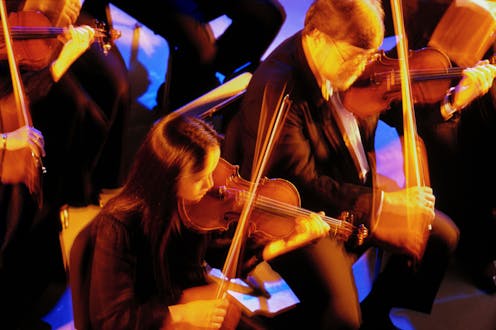NZ music schools under threat: we need a better measure of their worth than money
- Written by Dugal McKinnon, Associate Professor, Composition and Sonic Arts, Te Herenga Waka — Victoria University of Wellington

Funding for the arts and tertiary education in Aotearoa New Zealand has long been insufficient. Run the two together, as is happening this year, and we find ourselves at a precarious junction.
Arts and humanities departments in general are threatened by job and course losses due to the university underfunding crisis. In music education alone, the cuts have already been extensive.
Te Auaha, Te Pukenga’s creative campus in Wellington, has folded most of its music programmes. The Auckland campus of the Music and Audio Institute of New Zealand (MAINZ) is closing too.
Schools of music at Auckland, Waikato and Otago universities have all gone through significant restructuring over the past decade. Massey University’s creative programmes may be under review. The future of the New Zealand School of Music at Te Herenga Waka-Victoria University of Wellington is also uncertain.
The country’s creative and critical culture of music will be substantially diminished as a result. How can we sustain vibrant popular, classical, jazz, electronic and experimental music scenes without the institutions that nurture and produce musical talent?
Other measures of wealth
Music shapes and helps us understand who we are as people and as a culture. As the pioneering New Zealand composer Douglas Lilburn put it, we need “a music of our own, a living tradition of music created in this country”.
Or as musician and producer Hinewehi Mohi said more recently: “We need music and we need waiata Māori to really tie us together and create a sense of cultural identity and nationhood.”
Read more: Starved of funds and vision, struggling universities put NZ’s entire research strategy at risk
It may be a truism to say music and other art forms are a public good, but it’s a truth nonetheless. And in tough times the arts become nothing less than an essential service. Studies from Finland and Germany have shown how music helped people maintain a sense of community and wellbeing during pandemic lockdowns.
Even just bingeing on streaming services involves consuming the artistic labour of composers, sound designers, dialogue editors and scores of production creatives. In other words, we need the arts and artists, whether or not we’re conscious of it.
Furthermore, the Treasury’s Living Standards Framework now recognises values beyond the purely fiscal, and that “wealth” and “capital” have broader meanings “not fully captured in the system of national accounts, such as human capability and the natural environment”.
Short-term fixes and long-term harm
The social and economic benefits of music are well established, and were substantiated in the key findings of the Ministry of Culture and Heritage’s 2022 Valuing the Arts report.
The rewards are both social and individual. Educators, psychologists and employers are well aware of music’s cognitive, intellectual and behavioural benefits – including how group music making develops teamwork, empathy and grit, all components of resilience.
A rapidly changing world requires young performers, composers, technologists and thinkers who are able to keep pace. Short-term solutions to financial problems, however, can cause long-term harm.
Cuts to the New Zealand School of Music, and other similar programmes across the country, will have broad repercussions, diminishing the depth and breadth of music education. The creative industries will be starved of young talent (echoing labour shortages in other sectors).
Theatre faces the same destructive spiral. In a larger society, some damage might be absorbed. In a country of five million it becomes palpable.
Better funding models
The current tertiary funding model uses staff-student ratios as the primary funding metric. But this doesn’t work for music or any discipline where teaching and learning take place in small groups, intensively, often involving one-to-one tuition.
The argument that music and theatre courses should be cut because of low enrolments is perverse. A low staff-student ratio, along with specialist facilities and equipment, are beneficial for developing both individual talent and outstanding teamwork. Similar needs and costs are not challenged in science education, nor should they be in arts.
This kind of teaching can be time and labour intensive for students and teachers, but it is the only way to produce the results that define excellence. Students don’t learn to perform, compose or engineer compelling music in generic lecture theatres alongside hundreds of others.
Similarly, box-office returns and gross revenues aren’t great measures of true artistic, experiential and cultural value. Stadium shows may indicate commercial viability, but musicians and audiences thrive in intimate settings where new ideas and material can be tested and real rapport established.
Read more: The show must go on, but it's time to re-think how we fund the arts in NZ
Music and value
We clearly need a more nuanced and holistic measure of the value of arts and education than the simply financial. As Robert Kennedy famously said of GDP:
It measures neither our wit nor our courage, neither our wisdom nor our learning, neither our compassion nor our devotion to our country, it measures everything in short, except that which makes life worthwhile.
To that end, the Tertiary Education Commission, the government’s main interface with the sector, should reflect the Treasury’s Living Standards Framework when accounting for the broader social contribution of higher education.
Various precedents already exist in the form of international measures such as the Genuine Progress Indicator, the UN’s Human Development Index, the Thriving Places Index and the OECD’s Better Life Index.
All in various ways try to incorporate the importance of community, culture, work-life balance and overall life satisfaction. It should come as no surprise that wellbeing and participation in music are closely correlated.
Authors: Dugal McKinnon, Associate Professor, Composition and Sonic Arts, Te Herenga Waka — Victoria University of Wellington




